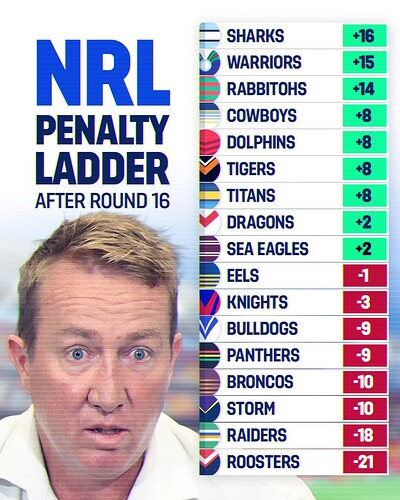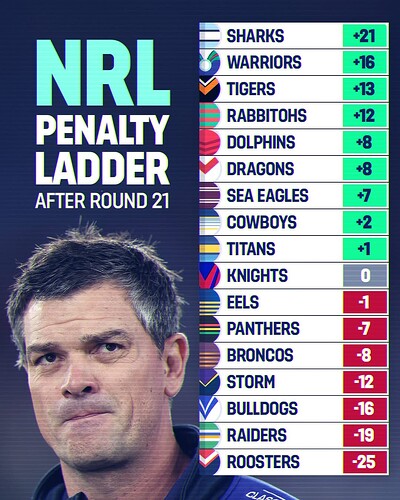I was originally just going to make one post regarding this in the refereeing thread, but have decided to make a whole new thread, as it has become another research project that could end up taking a fair bit of room.
I’m sure that any of you who are on any of the NRL pages on social media have heard the same crap as me (Panthers are only winning because the refs are helping them). While there are many metrics that referee’s “help” can be measured by, short of going through every game and watching it like a hawk (which I don’t have the time or energy for), the only metric readily available, especially for previous seasons, is penalty counts.
Having run an eye over the penalty counts in our games since the beginning of 2020 I have found a few things.
During this we have played 111 games (up to last week against the Tigers in Bathurst). We won 92, drew 1 & lost 18. The penalty counts in no way reflect this, having won 51, drawn 13 & lost 46. While on the surface it does show a slight bias towards us, it doesn’t explain the dominance we have shown.
Breaking these numbers down further, in the games we won the penalty count, we had a 46-5 record. In the games the penalty count was tied, we had a 10-3 record. In the games we lost the penalty count, we had a 36-10 record (and also had our draw). Looking at these results, it shows that we are slightly more likely to win the game when we win the penalty count, something that I’m sure that applies across the board, not just to Panthers.
Breaking this down by teams did show a few interesting things. During the last 4 years:
Broncos – played 8 games for a 7-1 record, penalty counts 6-1-1
Bulldogs – played 6 games for a 6-0 record, penalty counts 4-1-1
Cowboys – played 7 games for a 5-2 record, penalty counts 1-1-5
Dragons – played 4 games for a 4-0 record, penalty counts 0-1-3
Dolphins – played 1 game for a 1-0 record, penalty count 1-0-0
Eels – played 12 games for a 7-5 record, penalty counts 2-2-8
Knights – played 6 games for a 5-0 record (plus a draw), penalty counts 3-1-2
Rabbitohs – played 11 games for a 9-2 record, penalty counts 5-1-5
Raiders – played 5 games for a 5-0 record, penalty counts 5-0-0
Roosters – played 9 games for a 9-0 record, penalty counts 5-1-3
Sea Eagles – played 7 games for a 6-1 record, penalty counts 0-0-7
Sharks – played 6 games for a 5-1 record, penalty counts 3-2-1
Storm – played 11 games for a 7-4 record, penalty counts 5-1-5
Tigers – played 7 games for 5-2 record, penalty counts 5-1-1
Titans – played 4 games for a 4-0 record, penalty counts 2-0-2
Warriors – played 7 games for a 7-0 record, penalty counts 4-0-3
From here we can see that the team that has troubled us most over the last 4 years (Eels) is also the team we have lost the most penalty counts against. 4 of our 5 losses against the Eels during this time we have also lost the penalty count.
The Storm, who are the only other team to beat us more than twice during this time, have an even distribution of penalty counts against us, and a different breakdown, with the team winning the game more often losing the penalty count.
Despite our dominance over Manly in recent years (our game a few weeks ago was the only time they have defeated us during the last 4 years), we have lost every single penalty count against them.
I could go on dissecting this for ages, but it would basically come to the same conclusion: penalty counts have limited effect on the overall result and therefore do not explain our dominance over the last 4 years.
I remember doing a post several years ago (possibly on the old PI) doing a ladder as per the penalty counts, comparing it to the actual ladder. From memory is showed little if any correlation between winning penalty counts & winning games. I’m looking at going back over the years to see how it all compares again, possibly all the way back to 1908, as a ready reference guide for when people start using the excuse of referees winning game for a team. It will depend on how much time & energy I have (and if I maintain interest in doing so.
I have said before that I don’t believe that referees are deliberately helping or hindering teams. As someone who spent a number of years refereeing a different sport, my experience tells me that there are a few things that come into play:
- As referees learn how different teams & players play the game, they learn to look for certain things when refereeing them
- When players learn how different referees call the game, they learn how to get around the way the game is being called
- Referees may sometimes unconsciously give more leeway to teams and players who are more respectful & co-operative, than those who rely on abuse to try to get their way
Could these things be called bias? Maybe, but I still wouldn’t say that they are deliberately helping or hindering teams.

